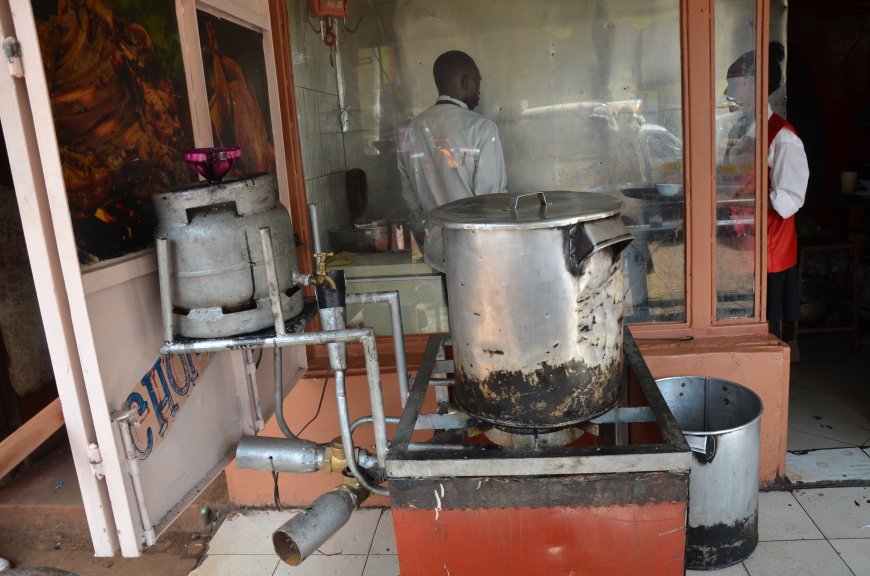Nyeri mechanic finds fortunes in making stoves that use old engine

Nyeri,
Wednesday, January 24, 2024
KNA by Wangari Mwangi/Samuel Maina
When we eventually arrive at Jacob Mwangi’s temporary workshop on the outskirts of Gaikanja Shopping Center in Nyeri County, the first thing that greets us is the aroma of freshly cooked ugali.
We are soon informed that the accompanying stew (a mixture of kale and spinach), will be ready in less than 15 minutes. The lunchtime meal is being prepared on a dummy of an oil-burning stove, which has been in the works for the past one week.
The stove is made using old steel pipes, but one of its most peculiar features is that it runs on used engine oil. At first glance, the cooker can pass for commercial burners found in appliance shops, but on a closer look, one notices a few variations; the entire structure is made from old steel pipes.
There are two mini fans on one end of the frame and the most peculiar difference is that the stove, has a cylinder suspended adjacent to the burners. It is this canister from a used mini-LPG cylinder that stores the oil which feeds the burner.
There are also two taps at the bottom of the suspended cylinder, which when turned on, dispense fuel into two funnels that are connected to two pipes. The two pipes eventually lead your eyes to two burners from where one cooks from.
“That viscous black liquid is old engine oil, which we have drained from a car engine at the garage. It is the main component in this innovation since it powers the stove,” said Mwangi who is assisted by four technicians.
Mwangi, a mechanic, adopted the idea after watching a video on You Tube video by Creative Inventions LMTN (an American self-made crafts). Whereas the 2022 YouTube video fetched over1.2 million views and 11,000 likes, that very same episode has enabled Mwangi to make a minimum of Sh 25,000 in profit for every unit he sells.
In addition, he says, he has found an ingenious way of utilizing the used oil that would otherwise be deemed worthless, as far as cooking is concerned.
“I decided to actualize the idea at a time when the cost of fuel was rising and everyone was looking for a relief from the high cost of energy. Besides being environment friendly, this jiko also provides a ready market for mechanics like me, who wish to have safer ways of discarding used oil,” he said.
Perhaps one of the outstanding features is that it operates just like a kerosene stove. However, the two automatic motors that aid in the supply of oxygen to the burner are operated using electricity. The used oil is then allowed to flow down to the cylindrical burners and once there is a sufficient amount of oil, the flame is ignited using a normal matchstick.
“In our fabrication, we have installed an internal fan, which upon rotation supplies oxygen to the burner,” he explained.
In less than one year, the mechanic has sold 10 commercial stoves. On this day, Mwangi was making adjustments to his 11th stove.
He tells us that when he fabricated his first stove, the customer returned it back for readjustments due to overheating but he has since improved on the stove hence clients rarely bring them back for adjustments.
“I had initially installed one motor, but now I am installing two motors, which have a timer. The motors have sensors, which regulate the heat generated by the motors. So when one motor gets hot, the functions are automatically shifted to the alternate motor, to ensure that it does not overheat,” explained the mechanic.
Once ignited, the stove can run continuously for more than 12 hours. A single cooker consumes 20 litres of used oil in a month with an additional Sh1,000 to cater for the electricity bill.
Due to its proven efficiency, Mwangi recommends institutions such as schools and hotels, to tap into the innovation, which he says will help in cutting cost on fuel.
“The stove is safe; it doesn't emit smoke. The cost is also pocket-friendly for both domestic and commercial customers. I am currently selling a commercial stove at Sh 40,000 but a domestic one would cost you Sh15,000. An even smaller version of the domestic use will cost you Sh8,000,” he explained.
Courtesy; KNA
What's Your Reaction?


































































































































































































































































































